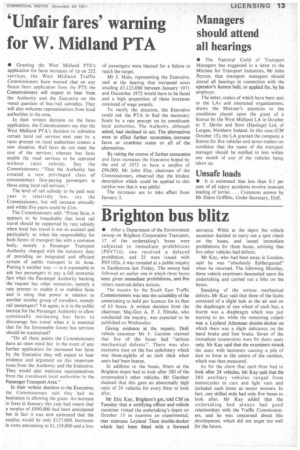'Unfair fares' warning for W. Midland PTA
Page 15

If you've noticed an error in this article please click here to report it so we can fix it.
• Granting the West• Midland PTE's application for fares increases of .1p on 252 services. the West Midland Traffic Commissioners have warned that on any future fares application from the PTE the Commissioners will expect to hear from the Authority and the Executive on the vexed question of bus /rail subsidies. They will also welcome representations, from local authorities in the area.
In their written decision on the fares application. the Commissioners say that the West Midland PTA's decision to subsidize certain local rail services next year by a rates precept on local authorities creates a new situation. Rail fares do not meet the cost of the services, whereas bus fares enable the road services to be operated without rates subsidy. Say the Commissioners: ."Thus the Authority has created a new privileged class of concessionary fare-paying passengers ie those using local rail services.
The level of rail subsidy to be paid next year is relatively low, say the Commissioners. but will increase annually and within five years could be £1m.
The Commissioners add: "Prima facie, it appears, to be inequitable that local rail travel should be supported by rate subsidy when local bus travel is not so assisted and particularly so when the responsibility for both forms of transport lies with a common body, namely a Passenger Transport Authority charged with the statutory duty of providing an integrated and efficient system of public transport in its Area. Putting it another way — is it reasonable to ask bus passengers to pay a full economic fare when the Passenger Authority backing the request has other resources, namely a rate precept to enable it to stabilize fares and is using that power in relation to another smaller group of travellers, namely rail passengers? Yet again, is it in the public interest for the Passenger Authority to allow continually increasing bus fares to discourage bus travel when it is essential that for the foreseeable future bus services should be maintained?
"On all these points the Commissioners have an open mind but in the event of any further application for increased bus fares by the Executive they will expect to hear evidence and argument on this important issue from the Authority and the Executive. They would also welcome representatives from the constituent local authorities in the Passenger Transport Area."
In their written decision to the Executive, the Commissioners said they had no hesitation in allowing the grant. An increase in fares in January this year had meant that a surplus of £990,000 had been anticipated but in fact it was now estimated that the surplus would be only £137,000. Increases in costs amounting to £1.139,000 and a loss of passengers were blamed for a failure to reach the target.
Mr J. Main, representing the Executive, said at the hearing that increased costs totalling £3,123.000 between January 1971 and December 1972 would have to be faced and a high proportion of these increases consisted of wage awards.
To rectify the situation, the Executive could ask the PTA to find the necessary funds by a rate precept on its constituent local authorities. The Authority, although asked, had declined to act. The alternatives were to effect further economies, increase fares or combine some or all of the alternatives.
By taking the course of further economies and fares increases the Executive hoped by the end of 1972 to have a surplus of £96,000. Mr John Else, chairman of the Commissioners, observed that the kindest description which could be applied to this surplus was that it was pitiful.
The increases are to take effect from January 2.




































































